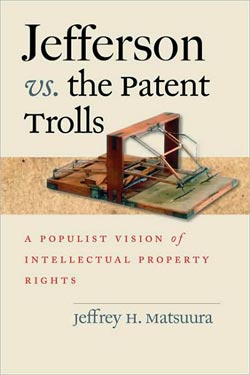A Droll Take on the Troll

An odd book is this. Thin and thinly documented, it does not offer anything new to Jefferson scholars or economic historians. The author, intellectual property rights (IPR) attorney Jeffrey Matsuura, wants to make U.S. patent law more “populist” and less “commercial” and finds in Thomas Jefferson a fellow traveler. Connecting one’s policy agenda to the Founding Fathers is sometimes an astute rhetorical maneuver. Leaning on Jefferson for support on economic issues, however, is a bit like Tiger Woods citing Alexander Hamilton on the sanctity of marital vows. It can be done but it isn’t going to be effective.
As Matsuura explains in dry, repetitive prose, Jefferson was a polymath who engaged in basic as well as applied (i.e., inventive) scientific activities. Although he was not a leader in any one area, Jefferson helped scientists in a variety of fields to make incremental improvements in knowledge. Jefferson’s paleontological work and his Notes on Virginia Matsuura particularly praises. The Sage of Monticello never tried to patent any of his inventions, even his “polygraph” letter copying machine, because he believed that all forms of knowledge should be shared widely for the benefit of all mankind. He did not wish to prevent inventors from making a “reasonable” profit on their improvements but sought to limit the state-sanctioned monopoly powers associated with patents.
Under the terms of the Patent Act of 1790, Secretary of State Jefferson was deeply involved in the quotidian duties of patent application screening. Due to his leadership, early U.S. patent policy hinged on the utility and (domestic) novelty of patent applications. According to Matsuura, Jefferson preferred to deny applications rather than extend them too freely. The number and complexity of applications, however, soon overwhelmed patent officials. With Jefferson’s backing, the United States in 1793 changed to a registration system whereby anyone who paid a fee and correctly completed an application received a patent defensible in the nation’s courts. According to economic historians like B. Zorina Khan (The Democratization of Invention, 2005), the new system, while not optimal, helped to drive America’s phenomenal record of economic growth in the nineteenth century. For Jefferson and Matsuura, however, the new system gave too much power to patent holders and commercialized the invention process, leading eventually to the emergence of patent trolls, entities that purchase patents to gain leverage in lucrative but largely frivolous patent infringement suits against deep pocket enterprises.

Patent trolls are of much too recent origin for Jefferson to have ever looked one in the eye, but the Virginian did take on their progenitors, entrepreneurs like Jacob Isaacks and Oliver Evans who tried to profit from their inventiveness via the patent system. (Again, Matsuura’s Jefferson did not disparage profit, just the use of state-sanctioned monopolies to acquire it.) The Evans case was particularly bizarre because Jefferson himself approved the patent for an automated milling process (which included bucket elevators, conveyor belts, and special screws) only later to infringe on it at his own mill! Jefferson infringed, Matsuura explains, because he had seen “firsthand how aggressive enforcement of broad patents can impede integration of innovations into daily personal and commercial activities.” Jefferson’s “motivation for using the proprietary materials was need, not economic gain. The Evans technology provided the most effective mill equipment, which Jefferson, and many other farmers, required” (107).
Jefferson’s argument was absurd, of course. Nobody “needed” to use Evans’s designs but they wanted to because, as Matsuura notes, they were the “most effective” then available. A miller should have been willing to pay to use the new technology at any price up to that which would make it and the old technology equally cost efficient. Diffusion was assured because it was not in Evans’s interest to charge any more than that for a use license.
As economist Ronald Coase showed long ago, assignment of property rights and freedom to trade are sufficient to ensure the most economically efficient result because each asset, regardless of its initial owner, will gravitate via trade to its most highly valued use. Jefferson missed that point (as does Matsuura) because of a mutual fixation on the initial assignment of the right rather than the economics of the subsequent technology diffusion. Demand for an invention did not drop to zero simply because it had a positive price. Moreover, the expectation of receiving payment for inventive activity increased the quantity and quality of inventions produced, a point that the Framers well understood. Some, like Jefferson and Benjamin Franklin, gave away inventions, but most people did not own a sufficient number of slaves or ground rents to be able to donate their time and genius to mankind. To take the trouble to invent something—large or small—most people needed incentives. Patents provided them and were directly proportional to the invention’s value to society, rendering them more efficient than the rewards or prizes proffered by some governments and associations.
But isn’t it immoral, as Matsuura suggests, to charge poor people to use a technology that could improve their deplorable conditions? Numerous recent books, none of which Matsuura consulted, suggest not. Poor countries remain so because their highly incompetent or outright predatory governments provide people with few incentives to invest in human or physical capital, not because they suffer from a dearth of technological knowledge, which will diffuse (legally or otherwise) to wherever it can be efficiently employed (vide the early United States and more recently China). If his government is corrupt, unstable, and unable to protect his life, liberty, or property, giving a man an idea will stave off want no more effectively than giving him the proverbial fish will. Weakening intellectual property rights, therefore, will hurt rich and poor alike, not spur economic development. The current system of intellectual property rights needs reform, but not that proposed by Matsuura or his preferred Founding Father.